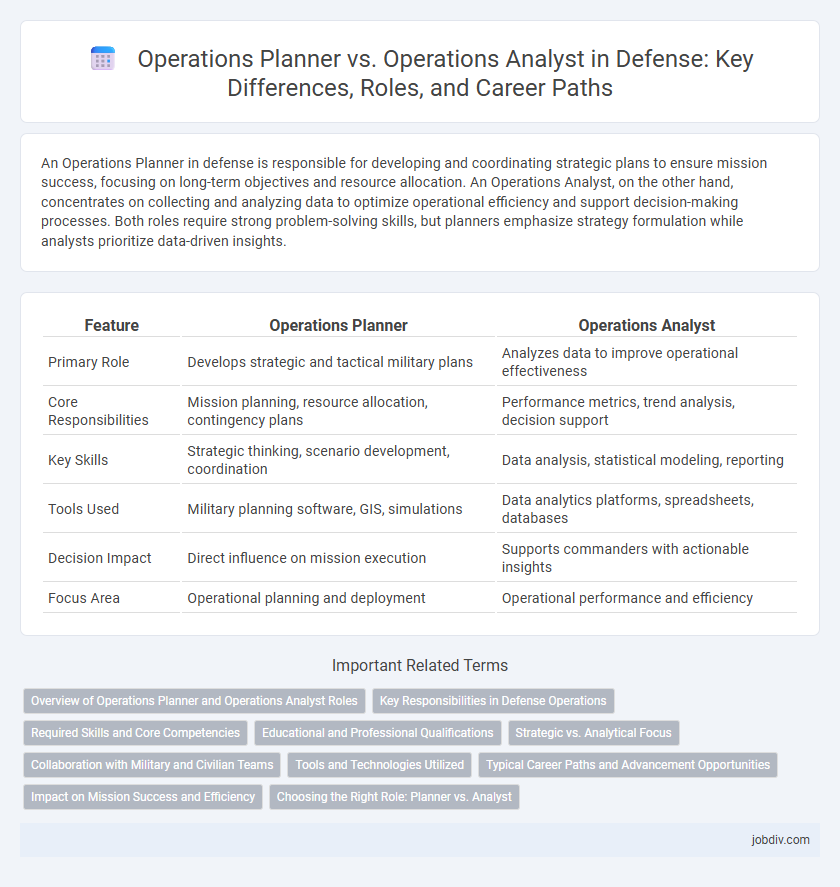An Operations Planner in defense is responsible for developing and coordinating strategic plans to ensure mission success, focusing on long-term objectives and resource allocation. An Operations Analyst, on the other hand, concentrates on collecting and analyzing data to optimize operational efficiency and support decision-making processes. Both roles require strong problem-solving skills, but planners emphasize strategy formulation while analysts prioritize data-driven insights.
Table of Comparison
| Feature | Operations Planner | Operations Analyst |
|---|---|---|
| Primary Role | Develops strategic and tactical military plans | Analyzes data to improve operational effectiveness |
| Core Responsibilities | Mission planning, resource allocation, contingency plans | Performance metrics, trend analysis, decision support |
| Key Skills | Strategic thinking, scenario development, coordination | Data analysis, statistical modeling, reporting |
| Tools Used | Military planning software, GIS, simulations | Data analytics platforms, spreadsheets, databases |
| Decision Impact | Direct influence on mission execution | Supports commanders with actionable insights |
| Focus Area | Operational planning and deployment | Operational performance and efficiency |
Overview of Operations Planner and Operations Analyst Roles
Operations Planners in defense focus on developing strategic plans to coordinate military missions and resource allocation, ensuring mission success under complex scenarios. Operations Analysts use data analysis, simulation models, and performance metrics to evaluate operational efficiency and recommend improvements for tactical and logistical processes. Both roles are critical for optimizing mission readiness, with Planners emphasizing strategy formulation and Analysts concentrating on data-driven decision support.
Key Responsibilities in Defense Operations
Operations Planners in defense focus on developing comprehensive strategic and tactical plans to ensure mission success, integrating intelligence, logistics, and resource allocation. Operations Analysts analyze operational data and performance metrics to optimize efficiency, identify potential risks, and support decision-making processes. Both roles are critical in enhancing defense readiness, with Planners emphasizing plan formulation and Analysts concentrating on data-driven evaluations.
Required Skills and Core Competencies
Operations Planners in defense require advanced strategic thinking, expertise in mission analysis, and proficiency in joint operations coordination to develop comprehensive operational plans. Operations Analysts focus on quantitative skills, data modeling, and performance assessment to evaluate operational effectiveness and optimize resources. Both roles demand strong knowledge of defense systems, critical problem-solving abilities, and effective communication to support decision-making processes.
Educational and Professional Qualifications
Operations Planners in defense typically hold advanced degrees in military science, strategic studies, or engineering, coupled with extensive field experience and operational command roles. Operations Analysts often possess strong backgrounds in mathematics, statistics, or computer science, with professional qualifications emphasizing data analysis, decision-support systems, and simulation modeling. Both roles require security clearances and continuous professional military education to ensure alignment with evolving defense strategies and emerging technologies.
Strategic vs. Analytical Focus
Operations Planners in defense concentrate on strategic mission design, aligning resources and timelines to achieve long-term military objectives. Operations Analysts emphasize data-driven analysis and modeling to optimize tactical decisions and resource allocation in real-time scenarios. Both roles integrate but differ by prioritizing strategic foresight versus analytical precision in operational effectiveness.
Collaboration with Military and Civilian Teams
Operations Planners coordinate closely with military commanders and civilian agencies to develop comprehensive strategies that integrate tactical objectives with logistical and policy constraints. Operations Analysts support these efforts by providing data-driven insights and simulations, enhancing decision-making through quantitative analysis of mission scenarios. Effective collaboration between Planners and Analysts ensures synchronized efforts across diverse military units and civilian organizations, optimizing operational outcomes and resource allocation.
Tools and Technologies Utilized
Operations Planners utilize advanced simulation software and geographic information systems (GIS) to develop and optimize strategic mission plans, leveraging tools such as JOPES (Joint Operation Planning and Execution System) and C2 (Command and Control) systems for real-time coordination. Operations Analysts focus on data analytics platforms, statistical modeling, and decision-support systems like MATLAB, Python, and specialized defense analytics tools to assess operational efficiency and resource allocation. The integration of AI and machine learning algorithms enhances predictive capabilities for both roles, enabling more data-driven and adaptive defense strategies.
Typical Career Paths and Advancement Opportunities
Operations Planners in defense often progress into strategic leadership roles, utilizing their expertise in mission design and resource coordination to influence large-scale operational frameworks. Operations Analysts typically advance by deepening their analytical skills,moving into senior roles focused on data-driven decision support and advanced modeling techniques. Both career paths offer opportunities for specialization in emerging technologies and joint operations, enhancing their value within defense organizations.
Impact on Mission Success and Efficiency
Operations Planners directly influence mission success by designing comprehensive strategies that optimize resource allocation and timing in dynamic combat environments. Operations Analysts enhance efficiency through data-driven assessments, identifying operational bottlenecks and recommending process improvements that reduce mission risks and increase effectiveness. Together, their combined expertise ensures missions are executed with optimal precision and adaptability, maximizing overall defense operational outcomes.
Choosing the Right Role: Planner vs. Analyst
Operations planners focus on strategic mission design, coordinating resources, and developing comprehensive action plans to achieve defense objectives. Operations analysts emphasize data-driven evaluation, modeling, and simulation to optimize operational efficiency and decision-making processes. Selecting the right role depends on whether the priority lies in high-level strategic planning or detailed analytical assessments within defense operations.
Operations Planner vs Operations Analyst Infographic

 jobdiv.com
jobdiv.com